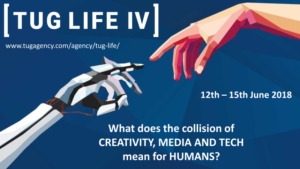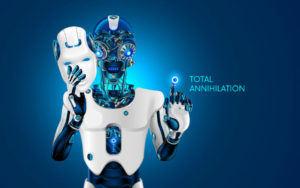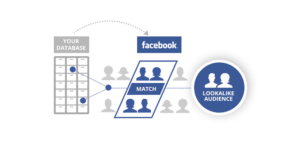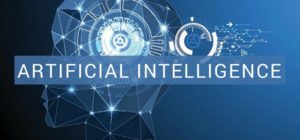 If one concept loomed over our recent TugLife IV conference like, say, a killer robot with a dark plan to steal your job, move into your house and leave all your clothes on the lawn, it was, of course, AI.
If one concept loomed over our recent TugLife IV conference like, say, a killer robot with a dark plan to steal your job, move into your house and leave all your clothes on the lawn, it was, of course, AI.
Don’t fear artificial intelligence, said speaker Pete Trainor, founder of custom AI specialist Talktous.ai, for it will make us better versions of ourselves. Fear it, suggested David Wood of London Futurists, because there is a 30 per cent chance of social collapse by the middle of the century, probably as a result of out-of-control technology.
So, if it isn’t a flippant question to ask as we await a possible techno-apocalypse: what interesting stuff can businesses do with AI and machine learning in the meantime?
Well, quite a bit. Increasingly, machine learning is infiltrating all kinds of sectors, and all kinds of everyday processes. AI applications already in use include the software that allows Uber passengers to check that a driver is verified, and real-time transcription to clarify muffled orders at McDonald’s drive-throughs. Maserati dealerships in China are using gaming combined with facial recognition to build a profile of your interests before you even enter a store.
 The essence of AI, in all these contexts, is the ability for machines to digest large amounts of data, learn what it means and create personalised responses.
The essence of AI, in all these contexts, is the ability for machines to digest large amounts of data, learn what it means and create personalised responses.
It might seem as if AI is purely for big business and those with the budgets to create bespoke software, but just as Siri and Amazon Echo have put AI in the hands of consumers, so we can expect a wave of off-the-shelf, AI-driven technology aimed at smaller companies.
Google is proud of the video in which a robotic assistant sets up a hair appointment by phone with a none-the-wiser receptionist. Do we all want to talk to machines? Not necessarily, but the sight of a computer talking to a living person is just an indication of the intelligence at work.
Most SMEs could afford to improve their sales, and already, numerous AI tools offer the ability to record and transcribe sales calls and provide performance recommendations: which words and approaches are most likely to result in sales, and what signals a person who is about to buy your product routinely sends out.
 In marketing, Facebook already offers advertisers ‘lookalike audiences’, using the customer data they provide, combined with machine learning, to find more of the same. But that’s just a start. Soon, marketers will able to build a picture of a consumer’s disparate interactions with a brand – via chatbots, social media, digital ads, influencer marketing, transactions and discarded shopping trolleys – and feed all that customer behaviour into personalised marketing strategies. If marketing personalisation has often looked clunky or crass, the injection of AI will allow for immeasurably more nuanced insights.
In marketing, Facebook already offers advertisers ‘lookalike audiences’, using the customer data they provide, combined with machine learning, to find more of the same. But that’s just a start. Soon, marketers will able to build a picture of a consumer’s disparate interactions with a brand – via chatbots, social media, digital ads, influencer marketing, transactions and discarded shopping trolleys – and feed all that customer behaviour into personalised marketing strategies. If marketing personalisation has often looked clunky or crass, the injection of AI will allow for immeasurably more nuanced insights.
Better understanding of data is going to allow the identification of possibilities and insights that were previously invisible to the naked eye. Companies will soon be able to use predictive analytics to predict churn, identifying key moments when valuable customers might defect, and triggering informed retention strategies.
 In search, the ability to draw new patterns out of the data will allow marketers to identify less obvious keywords that nonetheless correspond to high purchase intent, and to schedule campaigns for maximum impact.
In search, the ability to draw new patterns out of the data will allow marketers to identify less obvious keywords that nonetheless correspond to high purchase intent, and to schedule campaigns for maximum impact.
The marriage of human and machine, data, tech and creative, is only an AI-enhanced step along from the technique of BBDO copywriting legend John Caples, who ruthlessly refined his own creative work by constantly adapting his most commercially successful executions.
And somewhere in there lies another key AI insight that came up again and again at TugLife IV: to build the best, technology-enhanced new world, we need people and machines in step with each other. As Chris Williams, chief architect, IBM Watson Europe put it: “There is a role for everybody in this new future world, where machines are going to be alongside us helping with our jobs a lot more.”
Yes, we need to guard against the kind of technology that turns on us. But that robot uprising is only one of many possible AI futures.
 Article by Nick Beck, CEO, Tug
Article by Nick Beck, CEO, Tug
About Nick:
Nick founded Tug on the belief that search marketing was the first channel to bring Media and Creative back together into the same agency. With over 17 years of digital marketing experience, Nick’s advertising life started as a suit, servicing clients such as American Express, Unilever, Yahoo, IBM, Royal Mail and Mercedes Benz for Oglivy Interactive and JWT.
That blue chip experience coupled with a passion for digital media has helped Nick to build Tug into a global media agency that truly delivers to a client’s bottom line. His stated aim is simply to build an agency that ambitious clients want to work with and ambitious people want to work for.
Source: Tug

You must be logged in to post a comment Login